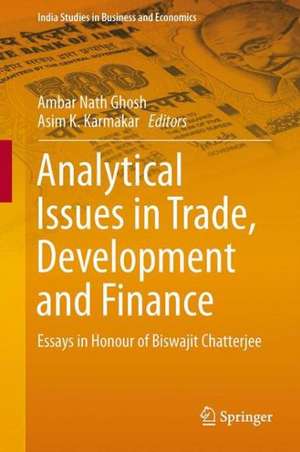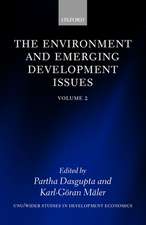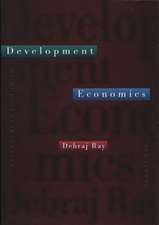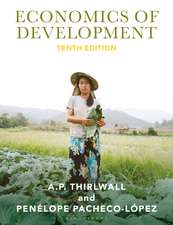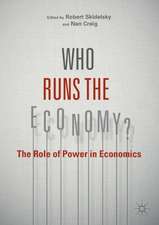Analytical Issues in Trade, Development and Finance: Essays in Honour of Biswajit Chatterjee: India Studies in Business and Economics
Editat de Ambar Nath Ghosh, Asim K. Karmakaren Limba Engleză Hardback – 12 mar 2014
Section I addresses analytical issues relating to trade-environment linkage, capital accumulation for pollution abatement, possibility of technology diffusion by multinational corporations, nature of innovation inducing tariff protection, effects of import restriction and child labour, the links between exchange rate, direction of trade and financial crisis—the implications for India and global economic crisis, financial institutions and global capital flows and balance of payments imbalances.
Section II consists of discussions on the causes of widespread poverty persisting in South Asia, development dividend associated with peace in South Asia, issues of well-being and human development, implications for endogenous growth through human capital accumulation on environmental quality and taxation,the rationale for a labour supply schedule for the poor, switching as an investment strategy, the role of government and strategic interaction in the presence of information asymmetry, government’s role in controlling food inflation, inter-state variations in levels and growth of industry in India, structural breaks in India’s service sector development, and the phenomenon of wasted votes in India’s parliamentary elections.
Section III deals with the effectiveness of monetary policy in tackling economic crisis, the effective demand model of corporate leverages and recession, the empirical link between stock market development and economic growth in cross-country experience in Asia, an empirical verification of the Mckinnon-Shaw hypothesis for financial development in India, the dynamics of the behaviour of the Indian stock market, efficiency of non-life insurance companies, econometric study of the causal linkage between FDI and current account balance in India and the implications of contagious crises for the Indian economy.
| Toate formatele și edițiile | Preț | Express |
|---|---|---|
| Paperback (1) | 653.79 lei 6-8 săpt. | |
| Springer India – 3 sep 2016 | 653.79 lei 6-8 săpt. | |
| Hardback (1) | 660.37 lei 6-8 săpt. | |
| Springer India – 12 mar 2014 | 660.37 lei 6-8 săpt. |
Din seria India Studies in Business and Economics
- 18%
 Preț: 897.65 lei
Preț: 897.65 lei -
 Preț: 361.78 lei
Preț: 361.78 lei - 18%
 Preț: 1006.24 lei
Preț: 1006.24 lei - 18%
 Preț: 952.89 lei
Preț: 952.89 lei - 20%
 Preț: 883.22 lei
Preț: 883.22 lei -
 Preț: 186.41 lei
Preț: 186.41 lei - 15%
 Preț: 636.94 lei
Preț: 636.94 lei - 15%
 Preț: 647.27 lei
Preț: 647.27 lei - 15%
 Preț: 646.30 lei
Preț: 646.30 lei -
 Preț: 409.89 lei
Preț: 409.89 lei -
 Preț: 372.98 lei
Preț: 372.98 lei -
 Preț: 389.88 lei
Preț: 389.88 lei - 18%
 Preț: 894.03 lei
Preț: 894.03 lei - 15%
 Preț: 644.30 lei
Preț: 644.30 lei - 15%
 Preț: 528.30 lei
Preț: 528.30 lei - 15%
 Preț: 643.65 lei
Preț: 643.65 lei - 15%
 Preț: 644.82 lei
Preț: 644.82 lei -
 Preț: 386.00 lei
Preț: 386.00 lei - 20%
 Preț: 559.76 lei
Preț: 559.76 lei - 15%
 Preț: 643.99 lei
Preț: 643.99 lei -
 Preț: 386.68 lei
Preț: 386.68 lei -
 Preț: 390.08 lei
Preț: 390.08 lei -
 Preț: 365.76 lei
Preț: 365.76 lei -
 Preț: 393.52 lei
Preț: 393.52 lei - 15%
 Preț: 656.74 lei
Preț: 656.74 lei - 24%
 Preț: 699.24 lei
Preț: 699.24 lei -
 Preț: 369.80 lei
Preț: 369.80 lei - 15%
 Preț: 642.68 lei
Preț: 642.68 lei -
 Preț: 388.90 lei
Preț: 388.90 lei - 15%
 Preț: 649.87 lei
Preț: 649.87 lei - 15%
 Preț: 645.28 lei
Preț: 645.28 lei -
 Preț: 372.66 lei
Preț: 372.66 lei -
 Preț: 389.17 lei
Preț: 389.17 lei - 20%
 Preț: 569.00 lei
Preț: 569.00 lei - 15%
 Preț: 641.85 lei
Preț: 641.85 lei -
 Preț: 392.97 lei
Preț: 392.97 lei - 15%
 Preț: 643.84 lei
Preț: 643.84 lei - 24%
 Preț: 656.32 lei
Preț: 656.32 lei - 15%
 Preț: 651.34 lei
Preț: 651.34 lei - 15%
 Preț: 641.53 lei
Preț: 641.53 lei - 15%
 Preț: 640.37 lei
Preț: 640.37 lei - 20%
 Preț: 569.86 lei
Preț: 569.86 lei
Preț: 660.37 lei
Preț vechi: 776.90 lei
-15% Nou
Puncte Express: 991
Preț estimativ în valută:
126.36€ • 131.94$ • 104.34£
126.36€ • 131.94$ • 104.34£
Carte tipărită la comandă
Livrare economică 15-29 aprilie
Preluare comenzi: 021 569.72.76
Specificații
ISBN-13: 9788132216490
ISBN-10: 8132216490
Pagini: 568
Ilustrații: XXIX, 538 p. 57 illus.
Dimensiuni: 155 x 235 x 36 mm
Greutate: 0.97 kg
Ediția:2014
Editura: Springer India
Colecția Springer
Seria India Studies in Business and Economics
Locul publicării:New Delhi, India
ISBN-10: 8132216490
Pagini: 568
Ilustrații: XXIX, 538 p. 57 illus.
Dimensiuni: 155 x 235 x 36 mm
Greutate: 0.97 kg
Ediția:2014
Editura: Springer India
Colecția Springer
Seria India Studies in Business and Economics
Locul publicării:New Delhi, India
Public țintă
ResearchCuprins
Section I: International Trade.- Chapter 1: Trade-Environment Linkage: A South-centric Model-specific Analysis.- Chapter 2: Accumulation of Capital for Pollution Abatement and Immizerizing Growth: A Theoretical Result for Developing Economies.- Chapter 3: Optimal Entry Mode for Multinationals with Possibility of Technology Diffusion.- Chapter 4: An Example of Innovation Inducing Tariff Protection.- Chapter 5: Import Restriction, Capital Accumulation and Use of Child Labour: A General Equilibrium Analysis.- Chapter 6: Direction of Trade, Exchange Rate Regimes and Financial Crises: The Indian Case.- Chapter 7: Global Crisis, Financial Institutions and Reforms: An Indian Perspective.- Chapter 8: Global Capital Flows & Payments Imbalances.- Section II: Development.- Chapter 9: Widespread Poverty Amidst High Economic Growth: Some Lessons from South Asia.- Chapter 10: Development Dividend of Peace: Experience of South Asia.- Chapter 11: Well-Being in Human Development Framework : Constituents and Aggregation.- Chapter 12: Human Capital Accumulation, Environmental Quality, Taxation and Endogenous Growth.- Chapter 13: Labour Supply Schedule of the Poor: A Commonsense Approach.- Chapter 14: Switching as an Investment Strategy: Revisiting Parrondo’s Paradox.- Chapter 15: Asymmetric Information, Non-Cooperative Games and Impatient Agents: Modeling the failure of Environmental Awareness Campaigns.- Chapter 16: Government’s Role in Controlling Food Inflation.- Chapter 17: Inter-State Variations in Levels & Growth of Industry: Trends During the Last Three Decades.- Chapter 18: Unit Root and Structural Break: Experience from the Indian Service Sector.- Chapter 19: Infrastructure Development and Regional Growth in India.- Chapter 20: The Phenomenon of Wasted Vote in the Parliamentary Elections of India.- Section III: Macroeconomics and Finance.- Chapter 21: Monetary Policy and Crisis.- Chapter 22: An Effective Demand Model of Corporate Leverage & Recession.- Chapter 23: Empirical Evidence on the Relationship between Stock Market Development & Economic Growth: A Cross-Country Exploration in Asia.- Chapter 24: Financial Development in India: An Empirical Test of the McKinnon-Shaw Model.- Chapter 25: Dynamics of Indian Stock Market.- Chapter 26: Analysis of Revenue Efficiency: Empirical Study of Indian Non-Life Insurance Companies.- Chapter 27: Empirics on Fiscal Smoothing : Some Econometric Evidence for the Indian Economy.- Chapter 28: Index of Financial Inclusion: Some Empirical Results.- Chapter 29: The Causal linkage between FDI and Current Account Balance in India: An Econometric Study in the Presence of Endogenous Structural Breaks.- Chapter 30: Contagious Financial Crises in the Recent Past and Their Implications for India.
Notă biografică
Dr. Ambar Nath Ghosh is a professor of economics at Jadavpur University, Kolkata and a former professor of economics at Presidency College, Calcutta. He has contributed many research articles in respected national and international journals. He specializes in macroeconomic theory, public economics, international trade and finance. His published books include: Economics of Public Sector (2008) and Macroeconomics (2011), both with Prentice Hall Pvt. Ltd., New Delhi.
Dr. Asim K. Karmakar is assistant professor of economics at Jadavpur University, Kolkata and managing editor of the quarterly referred journal, Artha Beekshan. He is also the Executive Council Member of ‘The Indian Econometric Society’. He has contributed many research articles in national and international journals of repute. He specializes in balance of payments, Indian economy and development economics. His published books include: Balance of Payments Theory and Policy (2010) andCapital Account Convertibility in India (Co-edited) (2011), Deep & Deep Publications, New Delhi and Food Security in India (co-edited) (2012), Regal Publications, New Delhi.
Dr. Asim K. Karmakar is assistant professor of economics at Jadavpur University, Kolkata and managing editor of the quarterly referred journal, Artha Beekshan. He is also the Executive Council Member of ‘The Indian Econometric Society’. He has contributed many research articles in national and international journals of repute. He specializes in balance of payments, Indian economy and development economics. His published books include: Balance of Payments Theory and Policy (2010) andCapital Account Convertibility in India (Co-edited) (2011), Deep & Deep Publications, New Delhi and Food Security in India (co-edited) (2012), Regal Publications, New Delhi.
Textul de pe ultima copertă
The book’s 30 chapters are divided into three sections – international trade, economic development, macroeconomics and finance – and focus on the frontier issues in each.
Section I addresses analytical issues relating to trade-environment linkage, capital accumulation for pollution abatement, possibility of technology diffusion by multinational corporations, nature of innovation inducing tariff protection, effects of import restriction and child labour, the links between exchange rate, direction of trade and financial crisis—the implications for India and global economic crisis, financial institutions and global capital flows and balance of payments imbalances.
Section II consists of discussions on the causes of widespread poverty persisting in South Asia, development dividend associated with peace in South Asia, issues of well-being and human development, implications for endogenous growth through human capital accumulation on environmental quality and taxation,the rationale for a labour supply schedule for the poor, switching as an investment strategy, the role of government and strategic interaction in the presence of information asymmetry, government’s role in controlling food inflation, inter-state variations in levels and growth of industry in India, structural breaks in India’s service sector development, and the phenomenon of wasted votes in India’s parliamentary elections.
Section III deals with the effectiveness of monetary policy in tackling economic crisis, the effective demand model of corporate leverages and recession, the empirical link between stock market development and economic growth in cross-country experience in Asia, an empirical verification of the Mckinnon-Shaw hypothesis for financial development in India, the dynamics of the behaviour of the Indian stock market, efficiency of non-life insurance companies, econometric study of the causal linkage between FDI and current account balance in India and the implications of contagious crises for the Indian economy.
Section I addresses analytical issues relating to trade-environment linkage, capital accumulation for pollution abatement, possibility of technology diffusion by multinational corporations, nature of innovation inducing tariff protection, effects of import restriction and child labour, the links between exchange rate, direction of trade and financial crisis—the implications for India and global economic crisis, financial institutions and global capital flows and balance of payments imbalances.
Section II consists of discussions on the causes of widespread poverty persisting in South Asia, development dividend associated with peace in South Asia, issues of well-being and human development, implications for endogenous growth through human capital accumulation on environmental quality and taxation,the rationale for a labour supply schedule for the poor, switching as an investment strategy, the role of government and strategic interaction in the presence of information asymmetry, government’s role in controlling food inflation, inter-state variations in levels and growth of industry in India, structural breaks in India’s service sector development, and the phenomenon of wasted votes in India’s parliamentary elections.
Section III deals with the effectiveness of monetary policy in tackling economic crisis, the effective demand model of corporate leverages and recession, the empirical link between stock market development and economic growth in cross-country experience in Asia, an empirical verification of the Mckinnon-Shaw hypothesis for financial development in India, the dynamics of the behaviour of the Indian stock market, efficiency of non-life insurance companies, econometric study of the causal linkage between FDI and current account balance in India and the implications of contagious crises for the Indian economy.
Caracteristici
Is a collected work in honor of Professor Biswajit Chatterjee, an acclaimed economist, learned scholar and researcher Focuses on some frontier issues in international trade, development economics, and macroeconomics and finance Deals with a wide variety of topics within each of the three areas mentioned above, in 30 essays and with a complete section devoted to contemporary issues regarding the economics of development in less developed countries in general, and India in particular Includes supplementary material: sn.pub/extras
